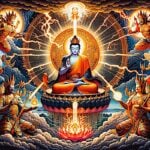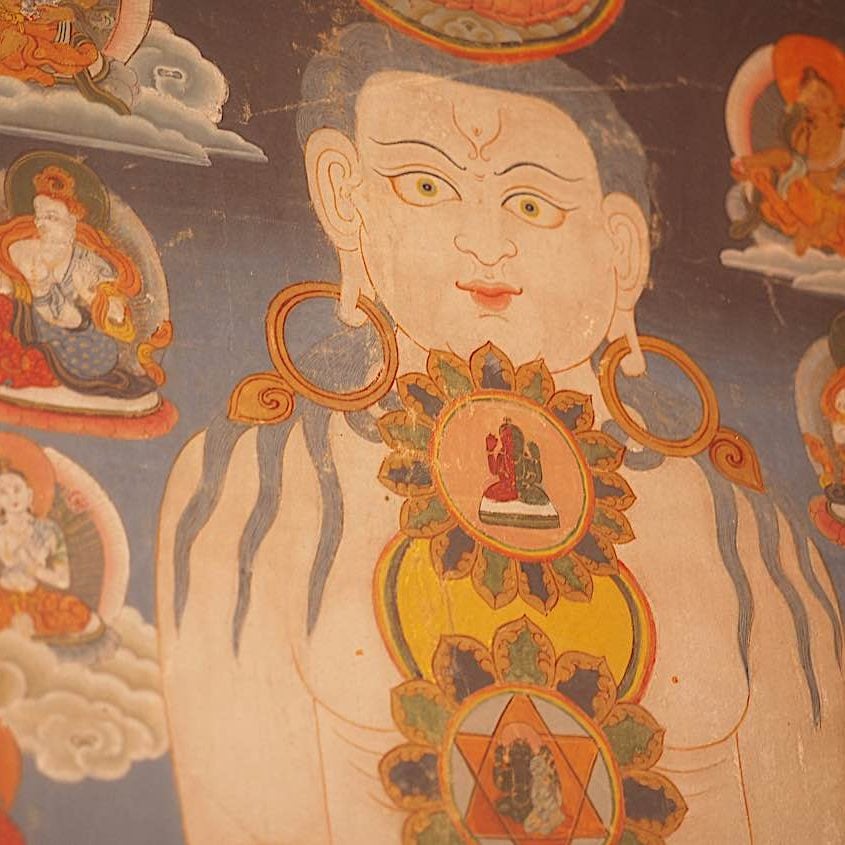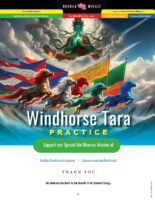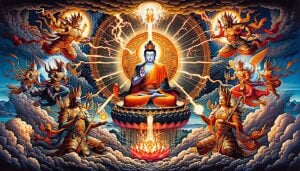Video: Reciting the Heart Sutra for Wisdom, Compassion, Purification; with Om Gate Gate Paragate Mantra
Daily recitation of the Heart Sutra is encouraged by most Mahayana and Vajrayana Buddhist teachers. It is a remedy for suffering, and for the accumulation of merit; wisdom; compassion; and success in Dharma practice.
PLEASE TURN ON CC for RECITE ALONG SUBTITLES and choose your language.
Video:
CONTENTS 00:00-01:59 Introduction to the Heart Sutra and Benefits of Reciting
02:00-05:23 Recitation of Heart Sutra in English
05:24-07:25 Mantra of the Perfection of Wisdom Om Gate Gate Paragate Parasamgate Bodhi Svaha
Hearing, or Reciting the Sutra out loud is an important, core practice. Reciting especially on Holy Days, such as the 15 Days of Miracles of the Buddha, and the dates celebrating Buddha’s first teaching, birthday, Enlightenment and Paranirvana, generates unimaginable merit.
Recite along with us now, and especially on Holy Days. May all beings benefit.
I prostrate to the Arya Triple Gem.
Thus did I hear at one time. The Bhagavan Buddha was dwelling on Mass of Vultures Mountain in Rajagriha together with a great community of monks and a great community of Bodhisattvas.
At that time, the Bhagavan was absorbed in the concentration on the categories of phenomena called “Profound Perception.”
Also, at that time, the Bodhisattva Mahasattva Arya Avalokiteshvara looked upon the very practice of the profound perfection of wisdom and beheld those five aggregates also as empty of inherent nature.
Then, through the power of Buddha, the Venerable Shariputra said this to the Bodhisattva Mahasattva Arya Avalokiteshvara:
“How should any son of the lineage train who wishes to practice the activity of the profound perfection of wisdom?”
He said that, and the Bodhisattva Mahasattva Arya Avalokiteshvara said this to the venerable Shariputra.
“Shariputra, any son of the lineage or daughter of the lineage who wishes to practice the activity of the profound perfection of wisdom should look upon it like this, correctly and repeatedly beholding those five aggregates also as empty of inherent nature.
Form is empty. Emptiness is form.
Emptiness is not other than form; form is also not other than emptiness.
In the same way, feeling, discrimination, compositional factors, and consciousness are empty.
Shariputra, likewise, all phenomena are emptiness, without characteristic, unproduced, unceased, stainless; not without stain, not deficient, not fulfilled.
Shariputra, therefore, in emptiness there is no form, no feeling, no discrimination, no compositional factors, no consciousness; no eye, no ear, no nose, no tongue, no body, no mind, no visual form, no sound, no odor, no taste, no object of touch, and no phenomenon.
There is no eye element and so on up to and including no mind element and no mental consciousness element.
There is no ignorance, no extinction of ignorance, and so on, up to and including no aging, and death, and no extinction of aging and death.
Similarly, there is no suffering, origination, cessation, and path,
There is no exalted wisdom, no attainment, and also no non- attainment.
Shariputra, therefore, because there is no attainment, Bodhisattvas rely on and dwell in the perfection of wisdom, the mind without obscuration and without fear.
Having completely passed beyond error, they reach the end- point of nirvana.
All the Buddhas who dwell in the three times also manifestly, completely awaken to unsurpassable, perfect, complete en lightenment in reliance on the perfection of wisdom.
Therefore, the mantra of the perfection of wisdom, the mantra of great knowledge;
the unsurpassed mantra, the mantra equal to the unequaled, the mantra that thoroughly pacifies all suffering, should be known as truth since it is not false.
The mantra of the perfection of wisdom is declared:
Tadyatha om gate gate paragate parasamgate bodhi svaha टद्यथ ॐ गते गते परगते परसम्गते बोधी स्वहा
Tadyatha Om gate gate paragate parasamgate bodhi svaha टद्यथ ॐ गते गते परगते परसम्गते बोधी स्वहा
Tadyatha Om gate gate paragate parasamgate bodhi svaha टद्यथ ॐ गते गते परगते परसम्गते बोधी स्वहा
Shariputra, the Bodhisattva Mahasattva should train in the profound perfection of wisdom like that.”
Then the Bhagavan Buddha arose from that concentration and commended the Bodhisattva Mahasattva Arya Avalokiteshvara saying:
“Well said, well said, son of the lineage, it is like that. It is like that; one should practice the profound perfection of wisdom just as you have indicated; even the Tathagatas rejoice.”
The Bhagavan having thus spoken, the venerable Shariputra, the Bodhisattva Mahasattva Arya Avalokiteshvara, and those surrounding in their entirety along with the world of gods, humans, asuras, and gandharvas were overjoyed and highly praised that spoken by the Bhagavan.
More articles by this author
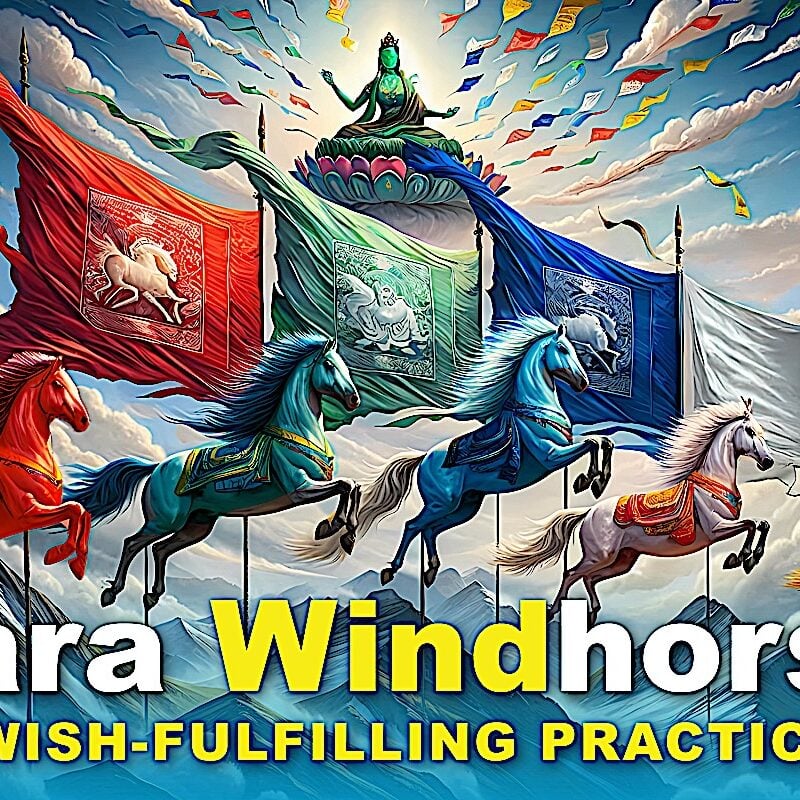
Windhorse Tara Practice: Tara, the Wind of Life; Tara, Goddess of Wind, Buddha of Activity, Karma Mother
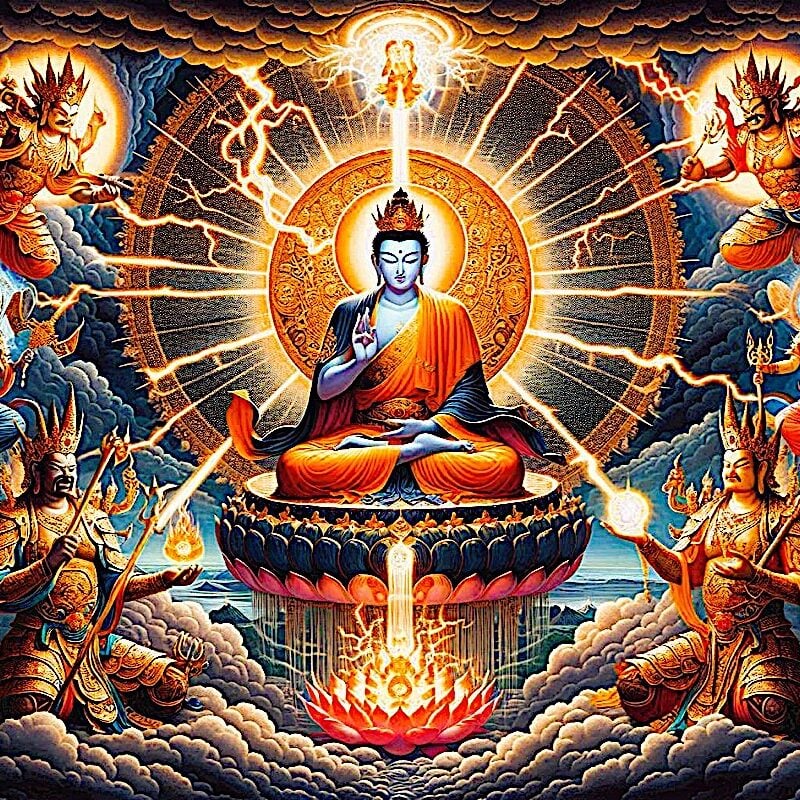
Protection from all Harm, Natural Disaster, Weather, Spirits, Evil, Ghosts, Demons, Obstacles: Golden Light Sutra: Chapter 14

SUPPORTING MEMBER VIDEO: Tara Windhorse – Buddhist Wish-Fulfilling Practice: the Mother of all Mantras, Chi, Wind and Prana

Guru Rinpoche is ready to answer and grant wishes: “Repeat this prayer continuously” for the granting of wishes
Search
Latest Features
Please support the "Spread the Dharma" mission as one of our heroic Dharma Supporting Members, or with a one-time donation.
Please Help Support the “Spread the Dharma” Mission!

Be a part of the noble mission as a supporting member or a patron, or a volunteer contributor of content.
The power of Dharma to help sentient beings, in part, lies in ensuring access to Buddha’s precious Dharma — the mission of Buddha Weekly. We can’t do it without you!
A non-profit association since 2007, Buddha Weekly published many feature articles, videos, and, podcasts. Please consider supporting the mission to preserve and “Spread the Dharma." Your support as either a patron or a supporting member helps defray the high costs of producing quality Dharma content. Thank you! Learn more here, or become one of our super karma heroes on Patreon.
Lee Kane
Author | Buddha Weekly
Lee Kane is the editor of Buddha Weekly, since 2007. His main focuses as a writer are mindfulness techniques, meditation, Dharma and Sutra commentaries, Buddhist practices, international perspectives and traditions, Vajrayana, Mahayana, Zen. He also covers various events.
Lee also contributes as a writer to various other online magazines and blogs.






